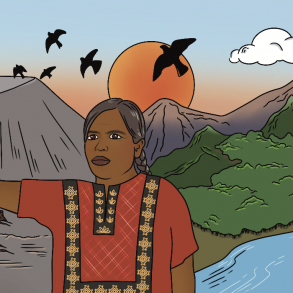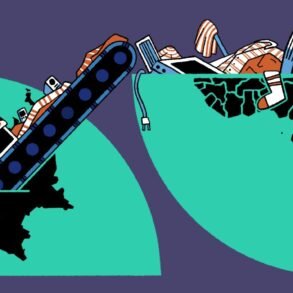In their new edited collection with Pluto Press and the Transnational Institute, Dismantling Green Colonialism: Energy and Climate Justice in the Arab Region, Hamza Hamouchene and Katie Sandwell expose the false promises of the unjust “green transition” that deems populations in the Global South expendable for the energy security of Europe. The text presents climate organisers with a roadmap for understanding and resisting the narratives of green colonialism.
A crisis of capitalist imperialism
The green transition is presented as a new paradigm for human civilisation, shedding its skin and stepping into a pollution-free techno-future to fulfil a promised green prophecy.
Hamza and Katie shatter this shiny facade through their study of green colonialism in the Middle East and North Africa. Colonial green energy projects merely extend the logics of capital accumulation for the few, and imperialist domination of the many, into a future on fire.
Organising to stay afloat on a drowning, burning planet amidst a televised genocide in Palestine the past five months has sharpened our view of the systemic links to be made between the climate movement and anti-colonial national liberation struggles.
Dismantling Green Colonialism argues that the transformation of our political and economic systems is core to a just transition, driving home the indivisibility of justice. A concerning portion of the climate movement sees any move towards renewable energy, and any transition away from fossil fuels, as a welcome effort.
Against this tide, the editors argue that how the transition is carried out, for whom, and to what ends is central to a climate justice that doesn’t exclude the global majority.
To understand a just transition, we must first diagnose the climate crisis as a crisis inherent to capitalist-imperialism, not just fossil fuels per se. Fossil fuels are a necessary resource that have made our planet livable for billions of people over the last two centuries. The climate crisis is a product of the exploitative patterns of fossil fuel extraction and distribution, geared towards powering the systems that concentrate wealth and power in the hands of a global elite at the expense of the global majority.
Dismantling environmental orientalism
Dismantling Green Colonialism demystifies the political ecology of the Middle East, subverting the dominant colonial gaze enforced upon it, which the authors aptly explain as “environmental orientalism.” This narrative sees environmental derelict in the Arab region as natural, rather than a manufactured reality resultant from centuries of colonialism and underdevelopment.
Deconstructing this narrative is therefore the first step in conceptualising a just transition that rejects the expendability of Arab populations. Whether we’re talking about occupied Palestine, the reactionary regimes of North Africa, the sub-imperial powers in the Gulf, or neighbouring Yemen, one of the poorest countries in the world currently facing a global economic and military blockade for acting in solidarity with Gaza, the book offers a comprehensive overview of what energy justice looks like in the most militarised region of the world.
The climate movement must contextualise the role of the region as a crucial node in the global flow of fossil capital, and begin to see Arab populations as agents of their own resistance whom we must forge crucial alliances of solidarity with. As the first widely available collection of critical writing on a just energy transition in the Middle East and North Africa, this text arrives at an important time.
Energy colonialism in the Arab region
Earlier this year, we blew past 1.5C warming above pre-industrial levels for an entire year – bringing us closer to a limit that world leaders committed not to breach at the 2015 Paris Agreement. With our fate firmly in the hands of bourgeois climate politicians, we are likely on the path towards 3C heating by the end of the century. The impacts of this will be much worse than simply double the catastrophes we see now at 1.5C, because the effects of warming are not linear. With ecological catastrophe on the horizon, why is it then necessary for climate resistance to not simply demand a transition to renewables, but a just and democratic one?
Hamza and Katie paint a devastatingly ugly, yet accurate, picture of what energy transition under capitalism currently looks like. While EU countries in the Global North endeavour to decarbonise their own economies, they promote extraction in the South to ensure their own energy security, all while reaping the merit of appearing to move “closer to net zero” on the world stage.
Hamza gives the example of France, which banned fracking nationally, then offered diplomatic support to its multinational Total to exploit shale resources in Algeria in 2013. European states are once again externalising environmental degradation amidst the war in Ukraine, as Algeria now produces 9 billion cubic metres of gas annually for Italy.
Decades of forced integration into the global capitalist economy through colonisation have forced Arab states to restructure their economies, making them outward-looking at the service of the imperial powers. North African economies are heavily dependent on the extraction and export of fossil fuels to Europe, which will leave them particularly vulnerable when the EU further reduces its imports of fossil fuels.
Meanwhile, a common thread that connects most case studies in the collection is how local energy plans within Arab states rely entirely on privatisation and full corporate control of the energy sector.
Tunisia’s transition plan, for example, relies on foreign funding and neglects democratic decision-making. Much of the energy to be produced through these neoliberal renewable projects is also to be exported to Europe.
This is green colonialism unmasked, which Hamza describes as “the extension of the colonial relations of plunder and dispossession to the green era of renewable energies, with the accompanying displacement of socio-environmental costs onto peripheral countries and communities.”
Contributors to the edited collection also highlight how green transition is used to enable continued occupation in multiple geographies. While Morocco uses renewable energy development as a red herring for its exploitation of Western Saharan lands and communities, “Israel” maintains its settler colonial grip in the region through eco-normalisation deals with neighbouring Arab states.
The environmental sector is outright leading Arab-Israeli normalisation with trade agreements over solar power and desalinated water. By happily betraying their own populations and shaking hands with the occupier, Arab leaders lock their states into relationships of dependency with the Zionist entity, which exploits the indispensability of water and energy – the bedrocks of life.
The logic of these normalisation deals is as follows: accept the settler colonial expansionist project of Zionism, or perish from a manufactured water scarcity amidst intensified climate crises.
Subscribe to shado's weekly newsletter
Exclusive event news, job and creative opportunities, first access to tickets and – just in case you missed them – our picks of the week, from inside shado and out.

Looking beyond the source
Dismantling Green Colonialism therefore pushes the climate movement to look beyond simply the source of the energy (fossil fuels or renewables) and instead towards the systems of power that underpin energy flow.
Why does energy flow in a particular direction? What activities does it fuel? What are the consistent production and consumption patterns maintained regardless of energy source?
Energy flow through cross-continental pipelines acts as a tangible manifestation of the global flows of capital and allows us to trace where power lies and who it is exerted against. There has been no stronger lesson in this for climate organisers than the ongoing genocide and ecocide in Gaza, which cannot be interpreted as separate from the Zionist theft of resources and the deliberate destruction of environmental infrastructure across all of historic Palestine.
Israel seeks to ethnically cleanse Gaza to make way for its ethnostate project, while also positioning itself as an outpost for Western imperial interests – including energy interests.
Energy theft and imperialism are thus in perfect synergy: the former fuels the latter to allow continued access to such resources. It is no wonder then that Western governments offer diplomatic assistance to their multinational energy corporations for the exploitation and extraction of resources in the Arab region.
This was on clear display when a US envoy in November declared that Gaza’s offshore gas fields represented potential for “economic revitalisation.” Israel also granted licences to a consortium of European companies to explore occupied Palestinian waters for gas, all while Gazans were lining up for days on end to access cooking gas amidst a genocide.
Organising for just transition
The climate movement must be able to locate and resist imperialist energy projects as they emerge, characterised by the monopolisation of energy production and the export of the capital generated by Western multinationals. Regardless of the “cleanliness” of Israel’s energy source in the era of green transition, the energy will continue to fuel its war machine which murders Palestinians and reproduces the settler colonial project.
Rejecting the liberal “green transition” and its contradictions is not enough. Dismantling Green Colonialism encourages us as climate organisers to adopt a “justice-centred” approach to the energy transition, that necessarily prioritises the fight for national liberation in the South.
Arab states must acquire the sovereignty to look inwards and “satisfy local needs first before embarking on any export initiatives”. As anti-colonial struggles emerge attempting to delink their economies from world imperialism, it is our duty to uplift them. The climate movement must unlearn the internalised logics of aid and development to understand Arabs as agents of their own struggles with a right to resistance.
When we organise and share the stories of European climate camps, we must also tell the stories of the North African climate camps like those of the Sidi Ayad communities which Hamza writes of. Through protests and open sit-ins, these communities have been resisting solar energy projects on Amazigh desert lands that are constructed as “barren” and “underutilised” by the multilateral institutions financing their exploitation. We must stay tethered to the internationalist nature of our struggle and the communities facing the brunt end of capitalist extractivism.
Dismantling Green Colonialism is essential reading for the climate movement, asking us to start by interrogating our energy-intensive imperial mode of living, looking beyond mere carbon emission targets and towards the nature of the transition being proposed which assumes continued Western access to and agency over colonised land and labour. Otherwise, we are fighting for the continuation of the current systems of oppression to simply be fuelled by an alternative energy source.
What can you do?
Read:
- Dismantling Green Colonialism: Energy and Climate Justice in the Arab Region. Hamza Hamouchene and Katie Sandwell. Pluto Press, 2023. Free open access available online.
- Climate Leninism and revolutionary transition: Organisation and Anti-imperialism in Catastrophic Times. Jodi Dean and Kai Heron. Spectre Journal 26 (2022).
- Imperialism, Ecological Imperialism, and Green Imperialism: An Overview. Alejandro Pedregal & Nemanja Lukic. Journal of labour and society (2024).
- How the British Museum’s partnership with BP has shown the world its allegiance to imperialism at any cost
Listen:
- Upstream podcast episode: Climate Leninism w/ Jodi Dean and Kai Heron. (2024)
- On Palestinian and Other Resistance In Times of Catastrophe – a Talk by Andreas Malm (December 2023).
Watch:
- Why our climate justice must be anti-imperialist – a teach-in with the Palestinian Youth Movement in Britain and Max Ajl. (December 2023)
- Foragers (2022). A documentary by Jumana Manna.
Organise!
- Join a local climate or Palestinian collective to learn how we resist imperialism through practice.










